#language tips
Text
Spanish Media/Input Recommendations?
Can you guys comment me some good media/input recommendations for someone learning Mexican/Spain Spanish? I' talking about any and all that you guys find interesting, whether you learned Spanish on your own or it's your native language!
Books
Podcasts
Tv Shows
Movies
Youtube channels
Songs/Musical Artists
Favorite Spanish teachers/tutors on Italki
Literally anything!
Thank you guys <3
#spanish studyblr#spanish langblr#spanish learning#spanish language#spanish#langblr#langblog#language tips#language learning#foreign languages#languages#language studyblr#language study#language goals#learn spanish#italki#spanish podcast#spanish books#university student#college student#español#mexican spanish#student life#student#college studyblr#college studyspo#language resources#language blog#languageblr#language learning tips
92 notes
·
View notes
Text
Keeping up your Languages when you’re Busy
Confession: I’ve been slacking on Japanese recently because my life has been so hectic recently. So here are some of the ways I’ve been trying to keep it in my brain when I can’t dedicate a lot of time to studying.
CHANGE YOUR PHONE LANGUAGE
This applies to computers as well! This is the easiest way to ensure you see at least some of your target language every day. It’s good for any level, even beginners.
If you haven’t already done this, do it now. I understand that some things are important and you need to be sure you understand them — in that case, you can always change individual apps to have different languages, just look up the app name in settings.
Podcasts/Music
Find some podcasts in your target language and listen to them before bed, during your commute, whatever. There are lots of podcasts made specifically for learners, or you can look up topics in your target language to find a podcast you might enjoy.
Music is also an amazing way to hear your target language being used. If you find an artist you like, that’s another good way to study your TL! Follow them on socials, look up interviews with them, etc.
Talk to Yourself
Any spare minute you have, talk to yourself in your target language. It doesn’t need to be out loud. You can have a conversation with yourself, try to express how you’re feeling, make up stories, or just describe the things around you in your target language. This is also a good way to see what kind of vocabulary you’re missing.
Apps
Duolingo has fired a ton of translators and started using crappy AI translations — so they’re probably not the best choice.
I’d recommend dictionary app that has some sort of flash card feature is also good, or an anki deck. Drops is good, and has a lot of languages, but keep in mind you’ll need audio. Anything that’s easy to get out and do for even just a few minutes is perfect.
Apps won’t teach you a language on their own, but doing a little every day helps remind me the language exists and keeps it in my mind.
Texting/Writing/Posting
Whether your friends know your TL or not, force them to experience it by randomly messaging in Japanese! Or, if you feel fancy, download an app like “HelloTalk”, “Tandem”, “Speaky”, “Tabee”…there are a lot.
If you keep a digital journal (like I do…inconsistently), try to write some entries in your TL.
If you have a blog, which I assume you do, post in your TL. Even if you’re a beginner, you can make a sideblog dedicated to saying stuff like “I’m hungry” and “Green is my favourite colour” in your target language.
Open your notes app and just write random words you can remember or sentences you can string together.
I know it’s really difficult, and don’t beat yourself up because you aren’t studying as hard. A language can be a lifelong companion — you’ll have phases of studying constantly, and sometimes it’ll take the back seat, but there’s no rush to learn it. Have a great day :)!
#language#language learning#langblr#languages#learning japanese#learning Spanish#learning French#Quinn posts#language learning apps#language learning resources#language learning advice#language tips#foreign languages#language resources#studyblr
113 notes
·
View notes
Text
How to not give up on language learning

Some time ago I received a message from someone who was highly demotivated and was thinking about giving up on language learning, although they were still attached to it ✉️
Out of my answer, I created this post with tips that helped me a lot while I was having a hard time with Japanese. I hope you'll find it helpful too 🥰
Reflection
Ask yourself if you really care about learning this language by writing down a list of pros and cons. Of course, you have to be extremely honest with yourself!
Bonus points if you have a planner you can take a look at to visualize the progress you made with time
Change your routine
It happened so many times that I was on the verge of giving up on a language, so during these moments of burnout, I usually take my current language-learning routine and change it!
I suggest taking some time away from textbooks to focus more on passive learning through native content
Change your mindset
Do not rely on comparison with other learners of the same target language, you should only compare to your past self
Wasted time does not exist, even when you are just relying on passive learning, as this practice helps you with slowing down the process of the forgetting curve
533 notes
·
View notes
Photo
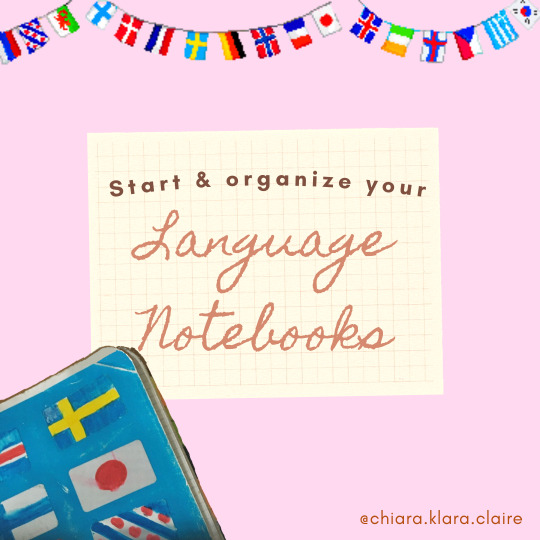
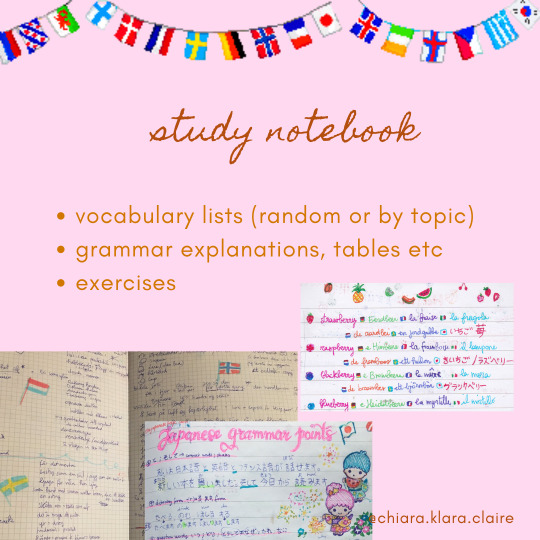

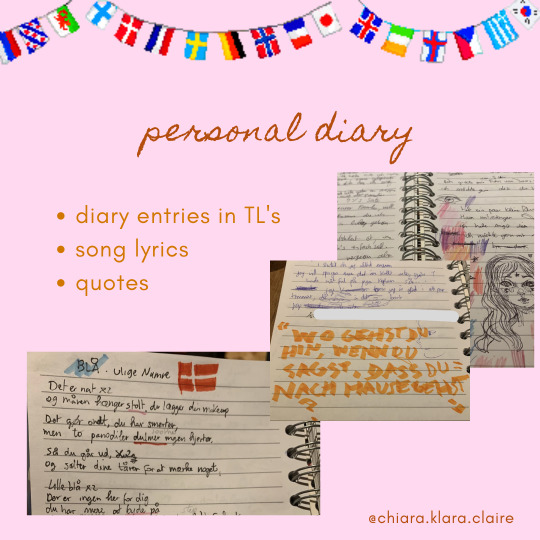

a little guide for those who want to use notebooks for their language journey!
#polyglot#language blog#notebooks#journaling#diary#language learning#foreign languages#langblr#studyblr#study tip#language tips#mine
341 notes
·
View notes
Text

#project batman#batman#bruce wayne#martial arts#training#exercise#fitness#work out#duolingo#language tips#english language#language learning#polyglot#français#italiano#português#deutsche#funny#humor#lol
40 notes
·
View notes
Text
I learn languages better when I don’t learn from a textbook.
I do fun little mini games or continuously try to translate poems, I make guesses on how words fit together until I have an unexplainable understanding of basic grammar, and only then do I check a textbook to explain what I understand.
We’re built to learn languages. When a language is taught, there’s a disconnect between the text’s explanation and actual, deep understanding that will help me learn more as time goes on. It’s great to be able to double check grammar rules to be sure I got it right, but I can’t learn when primarily “taught”.
#light academia#academia#world languages#learn languages#language learning#language#linguistics#aspiring polyglot#polyglot in training#langblr#studyblr#study tips#language tips#solo learning#learning tips#learning#euphrosynthetic
610 notes
·
View notes
Text
TIPS FOR LEARNING KOREAN!
HI!!! I'm Korean, but most of my communities are English-speaking, so these are my tips to improve fluency, retain knowledge in, and learn Korean!

1. Consume media in Korean
There's a bunch of Korean language entertainment, especially recently. I'll make a separate post on this one, but video games with Korean dubbing/text, k-drama, manhwa, etc. is very helpful!
2. Talk out loud
Even if you have no one to talk to in Korean, try reading your written/text work out loud! Even if it seems silly, it helps a lot more than you'd think.
3. Research Korean culture/history
Language is a part of society, so things that you may not understand in Korean could start making sense once you learn why it's said like that!
4. Don't overwork yourself
Rest is important. If you study too much, you may lose the practical/fun aspect to the language, and it can make you burn out! Don't do that.
5. Ask for help
If you know anyone willing to help, ask! My asks are always open for any questions that you may have ♡

#langblr#korean#korean language#korean langblr#language learning#language#south korea#korean language learning#learning korean#tips#language tips#learning tips#honey tip
13 notes
·
View notes
Text
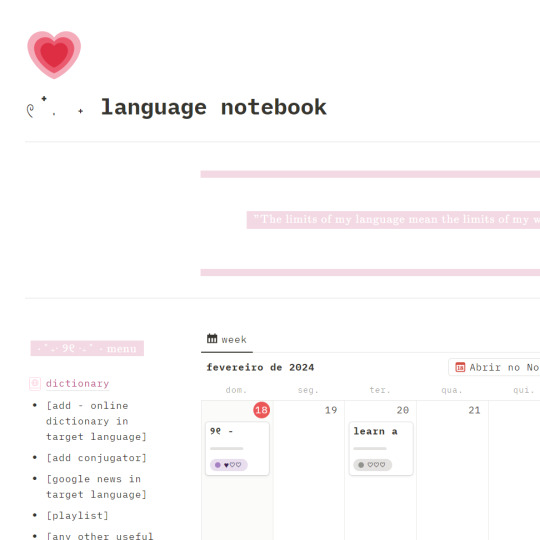

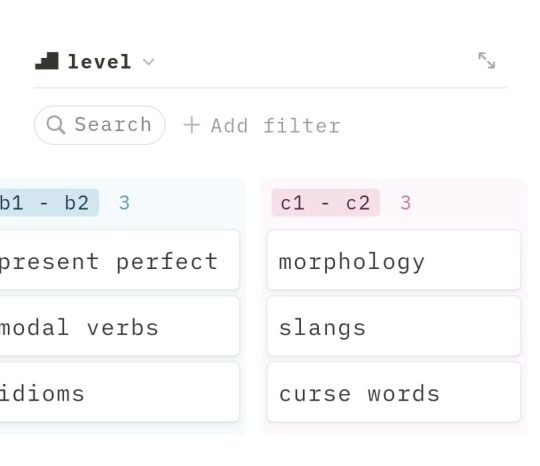
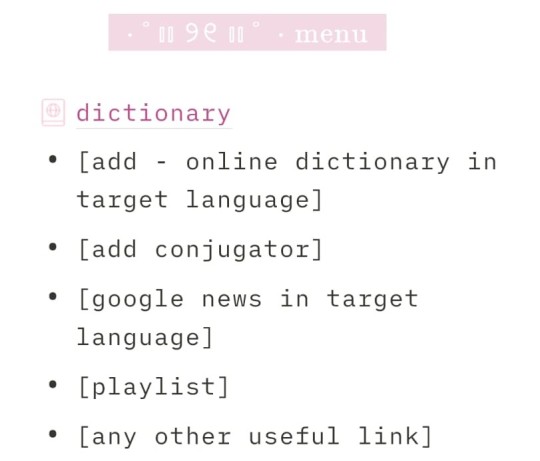
LANGUAGE LEARNING - NOTION TEMPLATE
(but make it girly <3)
Get the template here! [$2]
Language learning, the template contains:
Daily tasks to improve your studies
Challenge list
Synchronized dictionary (noun, verb, adjective, adverb)
Notebook area: create topics and take notes, divided by the CEFR Levels
Mobile friendy
#notion#notion template#studyblr#language learning#langblr#langblog#language tips#studies#languages hub#spanish#english#italian#french#duolingo#vocab#bilingual
13 notes
·
View notes
Text
100%!!!!
Stanislav shared a very helpful and powerful tip!
21 notes
·
View notes
Text
On language learning
Since I've recently seen some tips regarding this topic entering my feed I feel like adding some of my own and also give my own answer to some questions that people frequently pose:
What is the easiest/hardest language?
ANY language is hard if you don't put any effort or ambition into learning it.
Picking a very closely related language like Dutch if you are an English native or Polish if you are Czech might make you think it will just be smooth sailing but the moment you encounter difficulty and resistance you will be tempted to abandon it because you suddenly feel stupid for having a hard time with an "easy" language.
Conversely, if you are interested in Chinese, Arabic or Hungarian you might give up because those languages are so different from what you are used to. However, language is an universal human phenomenon. ANY language can be learned by ANY human. Plus, many grammatical concepts that seem intimidating at first actually exist in other languages but simply aren't called that way. Using a different tone to change the meaning of a word exists in English too, for example lead (metal) vs lead (action).
What is the best method of learning?
ANY method is better than not doing any learning at all. Yes, even memorizing grammar tables day in and out is more productive and gets you to your goal faster than spending days, weeks or months comparing and contrasting approaches. Moreover, if you do pick out one method that HAS to be the best, start using it and you still run into difficulties you will again be tempted to give up because the best method not working for you makes you feel stupid.
Anyway, I have more to say on the topic but maybe in another post.
31 notes
·
View notes
Text
can anyone recommend a good textbook for learning Spanish? I really like studying using textbooks and I have two from when I took Spanish classes but they are the most unhelpful textbooks ever and I absolutely despise using them unless I have no other choice.
preferably I’d like a textbook that focuses on grammar as vocabulary is pretty easy for me to pick up given how widely Spanish is spoken in my city.
I’m also open to any music, song, movie, book, tv show, and any other spanish language learning material! I want to be able to speak spanish with some of the people I work with and I think it’s a great and beautiful language for me to learn overall, and definitely will be the most helpful!
*I am still going to self study Japanese during my six week break from classes, but I am going to try to divide my time between spanish and Japanese with a stronger focus on spanish! May even start a six week language challenge during my break to keep me motivated and accountable!
so if you guys have any recommendations for someone learning spanish (and even Japanese) , please comment/reblog this!
thanks in advance <3
#self development#spanish langblr#spanish language#spanish#langblr#langblog#language resources#foreign languages#language tips#language learning#japanese language#languages#spanish learning#learn japanese tips#language learning goals#language learning tips#languageblr#language study#spanish studyblr#japanese studyblr#studyblr#college studyblr#uni student aesthetic#university student#college student#student life#studyblr community#study blog#language skills#study tumblr
54 notes
·
View notes
Text
Learning through immersion
(Specifically Spanish, for intermediate-advanced learners. Most of this can be used for any language though)
Consume native content without looking up anything. Just enjoy it. (Something written, or something which has a transcript/subtitles)
Now consume it a second time
Write down any interesting sentences. (Ideally with pen and paper, for it to stick)
Anything that has something that looks like a word you know, but is in a tense you’re not sure, just a new use of a tense, some interesting expression or vocab…
Go onto SpanishDict and type in those interesting conjunctions, figure out what tense they’re in
Learn that new tense! Either through SpanishDict (they have lessons for pretty much everything) or just google lessons online. This can be as in depth as you like, or you can just google a quick explanation
Create new vocab list of new words and quickly run through it
Re-consume native content after going through all your sentences with a new enlightened mind
On this run you can also read aloud (or mirror, if you have audio) the interesting sentences you wrote down. With feeling, please.
Then write something in your own words, using new grammar and vocab you’ve studied. Or speak aloud, and record yourself. You should try to write other sentences using a similar structure as whatever new interesting tense use you’ve found. If it suits you, get a native speaker to check your sentences, using Busuu, or HiNative, or something similar.
This is just one way that I’ve been enjoying recently. To be honest, you can cut out pretty much any of these steps depending on what suits you, how much time you have, etc.
The important thing is that you’re paying close attention to your content, and you absolutely need to write your own sentences afterwards.
Unless you genuinely have no interest in communicating with native speakers — maybe you just want to watch tv or read in your target language and that’s fine — but if you do want to be able to communicate, you’re going to need to practice. You should also be practicing speaking aloud. If you have nobody to talk to, talk to yourself.
This strategy is really useful for when you’ve self-studied the basics of a language and you don’t know what grammar you need to study next. Just let
#i hope this is coherent#btw I skip half these steps all the time#I do think it’s important to stumble through before looking things up tho#but you can do this by just…reading a paragraph in its entirity before googling whatever vocab and grammar#also this process doesn’t need to happen in one sitting#langblr#language#language learning#spanish#spanish langblr#learn spanish#linguistics#language tips#language resources#languages#spanish language#learning languages#language learning tips#how to learn Spanish#quinn posts#100
472 notes
·
View notes
Text
Try speaking in front of a mirror
I HIGHLY RECOMMEND THE FOLLOWING EXERCISE FOR THOSE LEARNING ANOTHER LANGUAGE:
speak to yourself in front of a mirror,and attempt to only use your target language
some guidelines i would use for beginners esp: try to use vocab you already might know (example: i speak _ language and i want to eat _ food), and try to keep speaking as long as possible. reiterate what you just said with a different sentence format, literally just speak as varied and as long as you are able to
this does a few things:
- shows what words and sentence structures you have a handle on
-what words you should learn next to keep speaking (words like for, this, now, tomorrow, yesterday) that dont always show up in vocab lists
-what you struggle with
-practices your speaking brain muscles, since you are only looking at yourself and not getting any assistance
others have probably already mentioned this, i feel like i heard about this from somewhere before but I can't remember but i just tried this and loved it
below i accidentally clicked the question button and couldnt delete it so now i ask you this question:
#cantonese langblr#langblr#studying#french langblr#it was daunting until it wasnt#boosted my confidence in my french BIGTIME#NOTE ive been doing some sentence writing practice the past few days which definitely helped#korean langblr#language tips#speaking tips
37 notes
·
View notes
Text


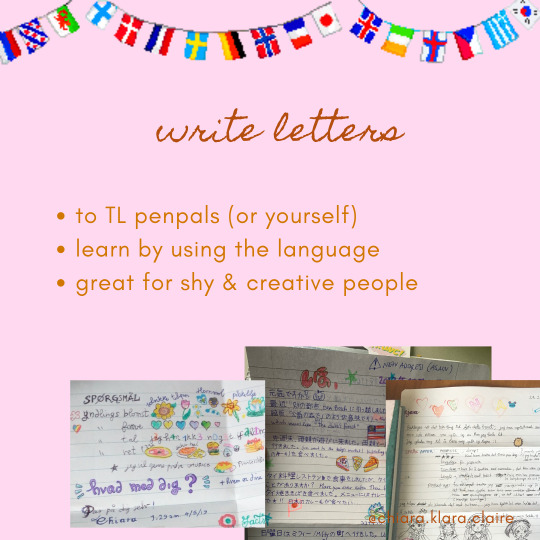


three cozy ways to practice languages (imo as a creative soul). On my masterpost you find vocabulary sites and more. Another cozy thing for me is looking up through my resources list to spice up things hehe. [art here 100% mine - @dreamyberry]
42 notes
·
View notes
Text
4 tips for your fast adoption of any language
1. Learn whole sentences instead of isolated words
our brain stores only useful things and we communicate in sentences, not in words
2. Learn the sentences by heart
superficial browsing through materials doesn't get people anywhere, it is a waste of time
3. Be active
try to translate the stuff from your real life instead of relying on your textbook all the time
4. Have FUN with the language
there are many fun and engaging resources
for students of Chinese there is an amazing site with countless wordplays
take your learning to the next level for a price of 2 coffees: https://herohero.co/chineseffect
#learn mandarin#learn chinese#chinese langblr#mandarin langblr#langblr#edublr#mandarin#mandarin edublr#chinese vocabulary#mandarin chinese#chinese edublr#study chinese#mandarin vocabulary#study mandarin#language#polyglot#foreign language#language tips#learning tips#中文#learning chinese#foreign languages#efficient learning#education#study languages#duolingo#language learning tips#study language
16 notes
·
View notes
